
by Sara Casey, Guma Patrick Isa, Earvin Isumbisho Mazambi, Monica M Giuffrida, Meghana Jayne Kulkarni, Shiromi M Perera
Global Public Health: An International Journal for Research, Policy and Practice, 29 July 2021
Abstract: Conflict and mass displacement into Protection of Civilian (POC) sites in South Sudan led to the breakdown of community and family structures, increasing women and girls’ vulnerability to gender-based violence and exacerbating already poor sexual and reproductive health outcomes. As one component of a study on post-abortion care, this study explores community perceptions of unintended pregnancy and abortion in a POC in Juba. Four focus group discussions were conducted with 36 women and married men aged 18–45 living in the POC. Although initial reactions to induced abortion were generally negative, participants discussed that unintended pregnancy and induced abortion appeared to have increased during the current conflict. Their discussion of abortion became less condemnatory as they described changes in people’s situation due to war, including instability and poverty, transactional sex, disruption of marital norms, rape, and low contraceptive use. This is one of the first studies to investigate community perceptions and practices related to unintended pregnancy and abortion in South Sudan. Despite the beliefs that these are taboo topics, the discussions provide an opening to reduce abortion stigma. To ensure lasting stigma reduction, investment in women and girls to improve gender equity is needed.
Note: As of 30 September 2017, the numbers of refugees from South Sudan in the region were about 17% of the total 12.7 million population.
PHOTO by Beatrice Mategwa/AFP/Getty Images
REFUGEE DATA by UNHCR, South Sudan Medical Journal, 2017



